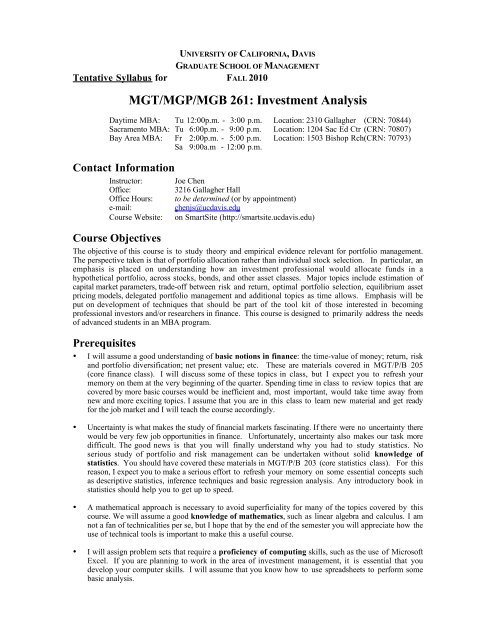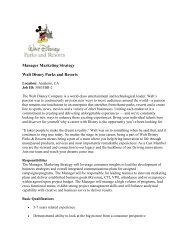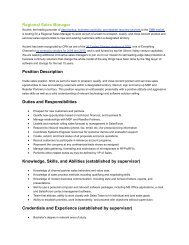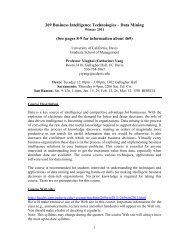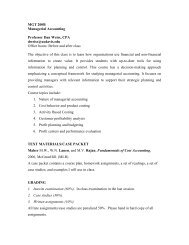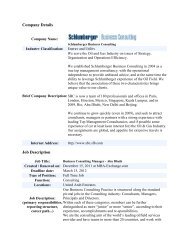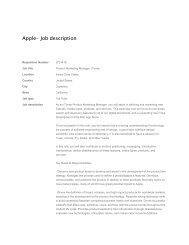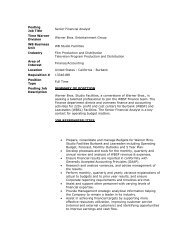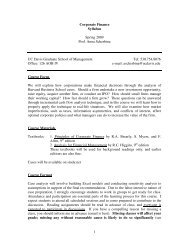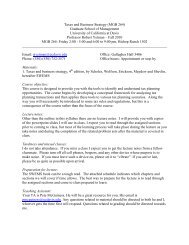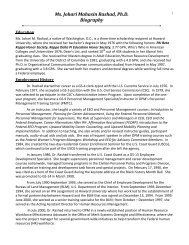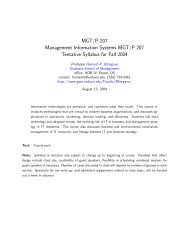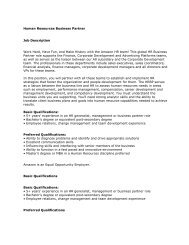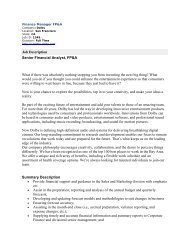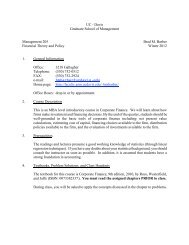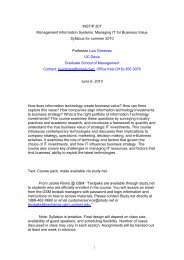MGT/MGP/MGB 261: Investment Analysis - Students - UC Davis
MGT/MGP/MGB 261: Investment Analysis - Students - UC Davis
MGT/MGP/MGB 261: Investment Analysis - Students - UC Davis
You also want an ePaper? Increase the reach of your titles
YUMPU automatically turns print PDFs into web optimized ePapers that Google loves.
UNIVERSITY OF CALIFORNIA, DAVIS<br />
GRADUATE SCHOOL OF MANAGEMENT<br />
Tentative Syllabus for FALL 2010<br />
<strong>MGT</strong>/<strong>MGP</strong>/<strong>MGB</strong> <strong>261</strong>: <strong>Investment</strong> <strong>Analysis</strong><br />
Daytime MBA: Tu 12:00p.m. - 3:00 p.m. Location: 2310 Gallagher (CRN: 70844)<br />
Sacramento MBA: Tu 6:00p.m. - 9:00 p.m. Location: 1204 Sac Ed Ctr (CRN: 70807)<br />
Bay Area MBA: Fr 2:00p.m. - 5:00 p.m. Location: 1503 Bishop Rch(CRN: 70793)<br />
Sa 9:00a.m - 12:00 p.m.<br />
Contact Information<br />
Instructor: Joe Chen<br />
Office:<br />
3216 Gallagher Hall<br />
Office Hours: to be determined (or by appointment)<br />
e-mail: chenjs@ucdavis.edu<br />
Course Website: on SmartSite (http://smartsite.ucdavis.edu)<br />
Course Objectives<br />
The objective of this course is to study theory and empirical evidence relevant for portfolio management.<br />
The perspective taken is that of portfolio allocation rather than individual stock selection. In particular, an<br />
emphasis is placed on understanding how an investment professional would allocate funds in a<br />
hypothetical portfolio, across stocks, bonds, and other asset classes. Major topics include estimation of<br />
capital market parameters, trade-off between risk and return, optimal portfolio selection, equilibrium asset<br />
pricing models, delegated portfolio management and additional topics as time allows. Emphasis will be<br />
put on development of techniques that should be part of the tool kit of those interested in becoming<br />
professional investors and/or researchers in finance. This course is designed to primarily address the needs<br />
of advanced students in an MBA program.<br />
Prerequisites<br />
• I will assume a good understanding of basic notions in finance: the time-value of money; return, risk<br />
and portfolio diversification; net present value; etc. These are materials covered in <strong>MGT</strong>/P/B 205<br />
(core finance class). I will discuss some of these topics in class, but I expect you to refresh your<br />
memory on them at the very beginning of the quarter. Spending time in class to review topics that are<br />
covered by more basic courses would be inefficient and, most important, would take time away from<br />
new and more exciting topics. I assume that you are in this class to learn new material and get ready<br />
for the job market and I will teach the course accordingly.<br />
• Uncertainty is what makes the study of financial markets fascinating. If there were no uncertainty there<br />
would be very few job opportunities in finance. Unfortunately, uncertainty also makes our task more<br />
difficult. The good news is that you will finally understand why you had to study statistics. No<br />
serious study of portfolio and risk management can be undertaken without solid knowledge of<br />
statistics. You should have covered these materials in <strong>MGT</strong>/P/B 203 (core statistics class). For this<br />
reason, I expect you to make a serious effort to refresh your memory on some essential concepts such<br />
as descriptive statistics, inference techniques and basic regression analysis. Any introductory book in<br />
statistics should help you to get up to speed.<br />
• A mathematical approach is necessary to avoid superficiality for many of the topics covered by this<br />
course. We will assume a good knowledge of mathematics, such as linear algebra and calculus. I am<br />
not a fan of technicalities per se, but I hope that by the end of the semester you will appreciate how the<br />
use of technical tools is important to make this a useful course.<br />
• I will assign problem sets that require a proficiency of computing skills, such as the use of Microsoft<br />
Excel. If you are planning to work in the area of investment management, it is essential that you<br />
develop your computer skills. I will assume that you know how to use spreadsheets to perform some<br />
basic analysis.
Exams, Assignments and Course Policy<br />
Grading Criteria<br />
The course grade is based on the following criteria:<br />
Assignments (5) 40%*<br />
Bi-weekly Quizzes (4) 30%*<br />
Final Exam 20%<br />
Participation 10%<br />
* For the purpose of grading, you are allowed to drop your lowest scoring assignment and replace it with<br />
your highest scoring assignment. However, an incomplete assignment may only be replaced with the<br />
average of remaining assignment scores. Similarly, you are allowed to drop your lowest quiz score and<br />
replace it with your highest quiz score. An incomplete (absent) quiz may also be dropped, but will be<br />
replaced with the average of the remaining quiz scores.<br />
Course Groups<br />
• Teamwork is a critical skill to be developed in investment management. Each class participants are to<br />
form into groups of 3-5 students. If you have problems creating groups or finding enough members,<br />
one will be assigned for you.<br />
• Name your group with business name appropriate for an investment company. Eg. “Aggie Inv’t Co.”<br />
• All assignments and the course project must be done in groups.<br />
Course Policy<br />
• Assignments: I will assign homework problems on a regular basis, which are to be done in groups.<br />
There will be a total of 5 assignments – (for Bay Area MBA: with the first assignment due on the<br />
first meeting). Submit one write-up for the entire group, being careful to note all the names of group<br />
members and the section number. Hard copies are preferred, but properly formatted electronic<br />
copies in PDF may also be submitted via the course website. Any documents submitted electronically<br />
must be properly formatted for printing – supporting documents should be provided as separate nonprinting<br />
pages. Unformatted MS Words or MS Excel files will not be accepted. Late assignments are<br />
NOT acceptable.<br />
• Quizzes and Final Exam: The quizzes and final exam are closed book and closed notes. You are<br />
not allowed to use any notes or “cheat sheets”. We will allow the use of non-programmable<br />
calculators during the exam. The final exam will be held during the last meeting sessions, rather than<br />
during the final exam period.<br />
• Makeup Quizzes and Final Exam: There will be no makeup quizzes or exams. Any missed quizzes,<br />
exams or assignment not turned in will receive a credit of zero and included in the computation of the<br />
final grade. By registering for this class you are committing, among other things, to take quizzes and<br />
exams on the scheduled dates.<br />
• Breaks: There are no scheduled breaks in the course schedule. However, there will be ample<br />
opportunities during our meetings to take necessarily excursions to restrooms or coffee rooms.<br />
• Office Hours: If you have any questions about the material covered in class please do not hesitate to<br />
see me. Please send me an e-mail to schedule an appointment (but please do not ask for an<br />
appointment for a time within 24 hours) or during office hours. Dropping in without an appointment<br />
outside of office hours is highly discouraged (except in emergencies). If you have problems keeping<br />
up with the material, do not wait hoping that things will get better. They will probably get much<br />
worse. Remember that the reason why you enrolled in this course is to learn some finance, not to<br />
survive through the course.
• E-mail and Course Forums: Open discussion of course materials is an integral component of the<br />
learning process – both in the classroom and outside. To facilitate ongoing discussion, we will be<br />
using the discussion forum on the course website extensively (on SmartSite). Make use of the forum<br />
to address any questions concerning the class – whether they are administrative questions or those<br />
regarding content. Do not use e-mail except for inquiries of personal or private nature. Questions<br />
submitted by e-mail regarding course materials will only be addressed via the course forums.<br />
• Return of Graded Paperwork: Returned paperwork, unclaimed by a student, will be discarded after 4<br />
weeks and, hence, will not be available should a grade appeal be pursued by a student following the<br />
receipt of his/her course grade.<br />
• Additional Course Materials: Homework assignments, solutions, additional readings, and all other<br />
additional course materials will be posted on the course web page. You are responsible for timely<br />
downloads of the materials from the course web page. I will also provide copies of my lecture<br />
notes on the course web page by the evening before the lecture.<br />
• Research Travel: <strong>UC</strong> <strong>Davis</strong> is a world-renowned research institution. The advantage of studying<br />
under our faculty is that you will be exposed to up-to-date leading research in finance (materials not<br />
found in any textbook). The disadvantage is that the faculty is sometimes required to share the ideas<br />
developed here with other research institutions and will periodically be unavailable on campus.<br />
• Calculators and Computers: The nature of the subject matter requires significant amount of<br />
numerical computations. <strong>Students</strong> are expected to bring a calculator to every class session and to all<br />
examinations. Moreover, use of laptop computers in the classroom may be necessary.<br />
• Tent Cards: Classroom participation and interaction is an integral part of the learning experience. To<br />
facilitate this, students are expected to bring a tent card to every class session and place it visibly.<br />
Textbooks and Additional Readings<br />
Textbooks<br />
• Required:<br />
<strong>Investment</strong> <strong>Analysis</strong>, 8 th Edition<br />
(referred to as BKM hereafter)<br />
Authors: Zvi Bodie, Alex Kane, and Alan Marcus<br />
Publisher: McGraw-Hill/Irwin (ISBN: 978-0073382371)<br />
Additional Readings<br />
• Required:<br />
A course reader (textpak) with copies of HBS cases will be assigned.<br />
Additional required readings may be assigned and provided electronically.<br />
• Highly Recommended:<br />
1. Daily reading of the Wall Street Journal or the Financial Times.<br />
2. Weekly reading of the Economist and Barron’s.<br />
• Recommended:<br />
Articles from: Journal of Portfolio Management and Financial Analysts Journal.
Tentative Course Outline and Assigned Readings<br />
This is a tentative course outline and assigned readings: topics and assigned readings are subject to<br />
change.<br />
1a. Overview of Portfolio Management<br />
We classify the main types of financial markets, and introduce the basic securities traded on them. We then<br />
discuss the different exchanges in which securities are traded, the typical positions taken and the costs<br />
associated with trading. We discuss some of the practical aspects of investment decision-making and<br />
introduce the process of portfolio management. We also study the industry of active portfolio<br />
management, such as mutual funds, pension funds and hedge funds. This section summarizes the basic<br />
institutional details we need to know when discussing the main themes of the investment process for<br />
equities.<br />
Required Reading: BKM, Chapters 1 (all), 3.6, 3.7, 28.1-28.3<br />
Optional Reading: BKM, Chapters 2.3, 2.4, rest of 3, 4 (all), 28.4, 28.5.<br />
1b. Quantitative Review, Historical Return <strong>Analysis</strong> and Portfolio Mathematics<br />
We review some basic concepts of statistics and probability theory: namely, means, standard deviations,<br />
variances, covariances and correlations. We discuss estimating these statistical moments using historical<br />
samples, as well as running and interpreting regression analysis. We also consider how to mathematically<br />
represent returns and portfolio holdings as to account for cash deposits and loans, margin accounts and<br />
short-selling.<br />
Required Reading: BKM, Chapters 5 (all), 17.2 and 17.5.<br />
Optional Reading: BKM, Chapters rest of 17<br />
2. Optimal Portfolio Choice<br />
We first introduce the notions of risk and portfolio diversification and discuss how to compute important<br />
descriptive statistics for portfolios of assets. We use Markowitz’s approach to portfolio formation to show<br />
how investors can take advantage of the correlation structure among assets to generate an investment<br />
opportunity set that dominates (in a reward-to-risk sense) any of the individual assets taken in isolation.<br />
We show how to construct the best set of attainable portfolios and provide precise measures for the benefits<br />
of portfolio diversification. We also discuss how different attitudes towards risk affect the composition of<br />
the portfolio held by each investor.<br />
Required Reading: BKM, Chapters 6 (all), 7 (all), 25.1, 25.2 and 25.3.<br />
Optional Reading: BKM, Chapters 25.4 and 25.5.<br />
3. Equilibrium Asset Pricing Models<br />
We assume that the investors are rational and, therefore, optimize their portfolio holdings according to their<br />
preferences, subject to their budget (and possibly some institutional) constraints. Using this approach we<br />
derive the Capital Asset Pricing Model (CAPM) and discuss its implications for asset pricing and<br />
investment-decision making. We then assume that assets returns are generated by a finite number of factors<br />
and all arbitrage opportunities are exploited, which lead to the Arbitrage Pricing Theory (APT).<br />
Required Reading: BKM, Chapters 8 (all), 9.1-9.4 and 10 (all).<br />
Optional Reading: BKM, Chapters 9.5 and 9.6<br />
4. Empirical Asset Pricing and Portfolio Management Performance Evaluation<br />
We discuss some of the main tests carried out to investigate the empirical merits of the asset pricing<br />
models discussed so far. We then go on to approach the problem of market efficiency: we discuss the<br />
different levels of efficiency (weak, semi-strong and strong) and analyze the basic empirical evidence that<br />
supports, or rejects, this notion. Anomalies to the asset pricing models and revised models are analyzed.<br />
We will also discuss how to evaluate past performance of portfolio management by investment advisors in<br />
the context of the asset pricing models. Specific topics include measures of past performance, survivorship<br />
bias, benchmarks and style drifts.<br />
Required Reading: BKM, Chapters 11.1, 11.2, 11.4, 11.5, 13.3, 24.1, 24.5-24.7, and 26.1-26.3.<br />
Optional Reading: BKM, Chapters 11.3, 12 (all), 24.2-24.4, 26.4-26.6, 27 (all).
UNIVERSITY OF CALIFORNIA, DAVIS<br />
GRADUATE SCHOOL OF MANAGEMENT<br />
Tentative Syllabus for FALL 2010<br />
<strong>MGT</strong>/<strong>MGP</strong>/<strong>MGB</strong> 461: <strong>Investment</strong> <strong>Analysis</strong><br />
Daytime MBA: Tu 12:00p.m. - 3:00 p.m. Location: 2310 Gallagher (CRN: 70844)<br />
Sacramento MBA: Tu 6:00p.m. - 9:00 p.m. Location: 1204 Sac Ed Ctr (CRN: 70807)<br />
Bay Area MBA: Fr 2:00p.m. - 5:00 p.m. Location: 1503 Bishop Rch(CRN: 70793)<br />
Sa 9:00a.m - 12:00 p.m.<br />
Contact Information<br />
Instructor: Joe Chen<br />
Office:<br />
3216 Gallagher Hall<br />
Office Hours: to be determined (or by appointment)<br />
e-mail: chenjs@ucdavis.edu<br />
Course website: on SmartSite (http://smartsite.ucdavis.edu)<br />
Course Objectives<br />
The objective of this practicum course is to apply theory and knowledge of portfolio management to a<br />
realistic asset allocation problem. The course centers on a major project based on a realistic investment<br />
management exercise by a financial advisor for a client with a hypothetical portfolio. <strong>Students</strong> are expected<br />
to make informed capital market assumptions, perform portfolio optimization with necessary investment<br />
constraints, and make stock selection decisions in the context of a benchmarked portfolio. In addition,<br />
students are expected to incorporate tools learned in other classes in order to understand how to run a<br />
money management business. Emphasis will be put on addressing real problems faced by investment<br />
professionals responsible for welfare of their clients. This course is designed primarily to address the needs<br />
of advanced students in an MBA program interested in managing portfolios professionally or personally.<br />
Co-requisite<br />
• This course is a practicum designed to accompany <strong>Investment</strong> <strong>Analysis</strong>. It is expected that<br />
you are concurrently enrolled in <strong>MGT</strong>/P/B <strong>261</strong>. You are not required to enroll in this course to<br />
complete <strong>MGT</strong>/P/B <strong>261</strong>. However, this course will provide additional practical exercise designed<br />
to further your understanding of materials learned in investment analysis, as well as materials in<br />
other courses you have taken.
Grading Criteria and Course Policy<br />
Grading Criteria<br />
The course grade is based on the following criteria:<br />
Course Project 70%<br />
Participation 30%<br />
Course Groups<br />
• Teamwork is a critical skill to be developed in investment management. Each class participants are to<br />
form into groups of 3-5 students. If you have problems creating groups or finding enough members,<br />
one will be assigned for you.<br />
• Name your group with business name appropriate for an investment company. Eg. “Aggie Inv’t Co.”<br />
• The course project must be done in groups. It is recommended that the group be the same as the one<br />
for the co-requisite class, <strong>MGT</strong>/P/B <strong>261</strong>, <strong>Investment</strong> <strong>Analysis</strong>.<br />
Course Policy and Office Hours<br />
• Course Project: There will be one major project dealing with asset allocation. We will be working<br />
on this project throughout the term, with small sections due intermittently. We will apply the<br />
portfolio choice and diversification theory from class to some actual real-life scenarios. Extensive use<br />
will be made of Excel (or any other mathematical package). The project must be done in your groups.<br />
A final printed version of the project write-up must be delivered on December xxx, during the<br />
designated final exam period.<br />
Furthermore, the project will involve presentation components. Each group must also prepare two<br />
Powerpoint presentations. The first is a shorter (five minute) presentation on a small portion of the<br />
project, which will be due as the course progresses (see course schedule). The second presentation is<br />
the final presentation due during the final exam period. You may sign up for presentation slots as<br />
soon as groups are formed.<br />
• Mandatory Office Hours: There is a mandatory (at least 20 minutes) office meeting, which can be<br />
conducted in person or over web-conferencing. This meeting is designed to ensure your group is<br />
making good progress towards presentation of your work. The ideal time is to meet prior to your<br />
group’s shorter presentation during the quarter. Additional meetings can be scheduled as needed.<br />
• Other Policies: All course policies listed under <strong>MGT</strong>/<strong>MGP</strong>/<strong>MGB</strong> <strong>261</strong> also apply for this course.
Tentative Course Schedule for <strong>MGT</strong>/P/B <strong>261</strong> and <strong>MGT</strong>/P/B 461<br />
Subject to change and approval.<br />
Day Section Sacramento Section Bay Area Section Length Deliverable<br />
1 Sep 28 12:00pm-3:00pm Sep 28 6:00pm-9:00pm Sep 24 12:00pm-3:00pm 180min Due: Assignment #1<br />
2 Oct 5 12:00pm-2:30pm Oct 5 6:00pm-8:30pm Sep 25 12:00pm-2:00pm 150min Quiz #1<br />
P1 Oct 5 2:30pm-3:00pm Oct 5 8:30pm-9:00pm Sep 25 2:00pm-3:00pm 30min<br />
3 Oct 12 12:00pm-3:00pm Oct 12 6:00pm-9:00pm Oct 8 12:00pm-3:00pm 180min Due: Assignment #2<br />
4 Oct 19 12:00pm-2:00pm Oct 19 6:00pm-8:00pm Oct 9 12:00pm-2:00pm 120min Quiz #2<br />
P2 Oct 19 2:00pm-3:00pm Oct 19 8:00pm-9:00pm Oct 9 2:00pm-3:00pm 60min Project part 1<br />
5 Oct 26 12:00pm-3:00pm Oct 26 6:00pm-9:00pm Oct 22 12:00pm-3:00pm 180min Due: Assignment #3<br />
6 Nov 2 12:00pm-2:00pm Nov 2 6:00pm-8:00pm Oct 23 12:00pm-2:00pm 120min Quiz #3<br />
P3 Nov 2 2:00pm-3:00pm Nov 2 8:00pm-9:00pm Oct 23 2:00pm-3:00pm 60min Project part 2<br />
7 Nov 9 12:00pm-3:00pm Nov 9 6:00pm-9:00pm Nov 5 12:00pm-3:00pm 180min Due: Assignment #4<br />
8 Nov 16 12:00pm-2:00pm Nov 16 6:00pm-8:00pm Nov 6 12:00pm-2:00pm 120min Quiz #4<br />
P4 Nov 16 2:00pm-3:00pm Nov 16 8:00pm-9:00pm Nov 6 2:00pm-3:00pm 60min Project part 3<br />
9 Nov 23 12:00pm-3:00pm Nov 23 6:00pm-9:00pm Nov 19 12:00pm-3:00pm 180min Due: Assignment #5<br />
Fin Nov 30 12:00pm-1:30pm Nov 30 6:00pm-7:30pm Nov 20 12:00pm-1:30pm 90min Final Exam<br />
P5 Nov 30 1:30pm-3:00pm Nov 30 7:30pm-9:00pm Nov 20 1:30pm-3:00pm 90min Project Rough Draft<br />
PF xxx 12:00pm-3:00pm xxx 6:00pm-9:00pm xxx 12:00pm-3:00pm 180min Project Presentation<br />
Meetings 1-9 are regular meeting times for <strong>MGT</strong>/P/B <strong>261</strong><br />
Meeting ‘Fin’ is the final exam period for <strong>MGT</strong>/P/B <strong>261</strong><br />
Meetings P1-P5 are meeting times for the practicum (<strong>MGT</strong>/P/B 461)<br />
Meeting `PF’ is the practicum project presentation period for the practicum (<strong>MGT</strong>/P/B 461)<br />
Note: total scheduled meeting time for <strong>MGT</strong>/P/B <strong>261</strong> is 1500minutes (equals 3 quarter units). Total schedule meeting times for <strong>MGT</strong>/P/B 461 is 480minutes,<br />
plus additional 20minutes of mandatory office hours (equals 1 quarter unit).<br />
Note: scheduled final exam period for <strong>MGT</strong> <strong>261</strong>/461 is December 10-11. Scheduled final exam period for <strong>MGP</strong> <strong>261</strong>/461 is December 6-10. Scheduled final<br />
exam period for MBG <strong>261</strong>/461 is December 10-11. The exam date and time is still to be determined.


